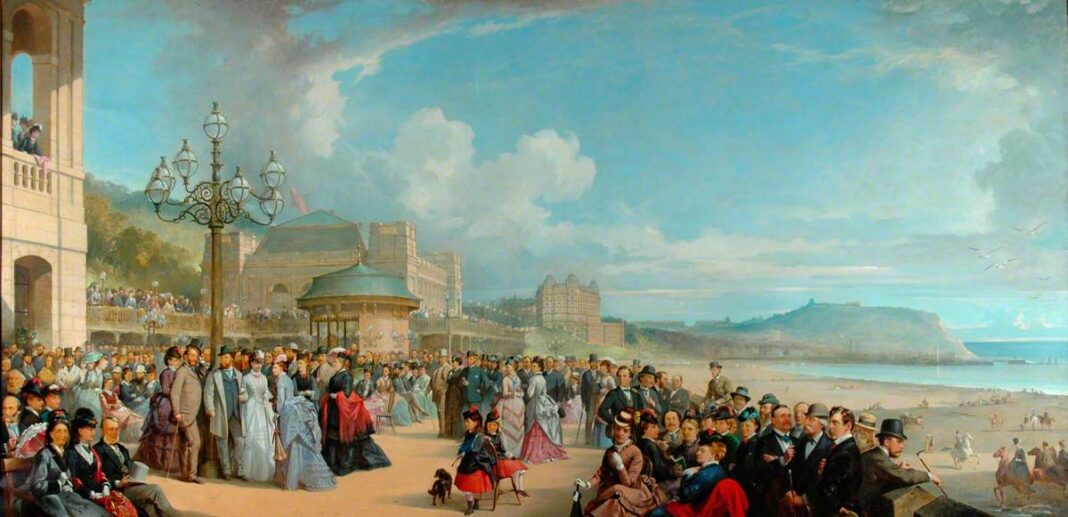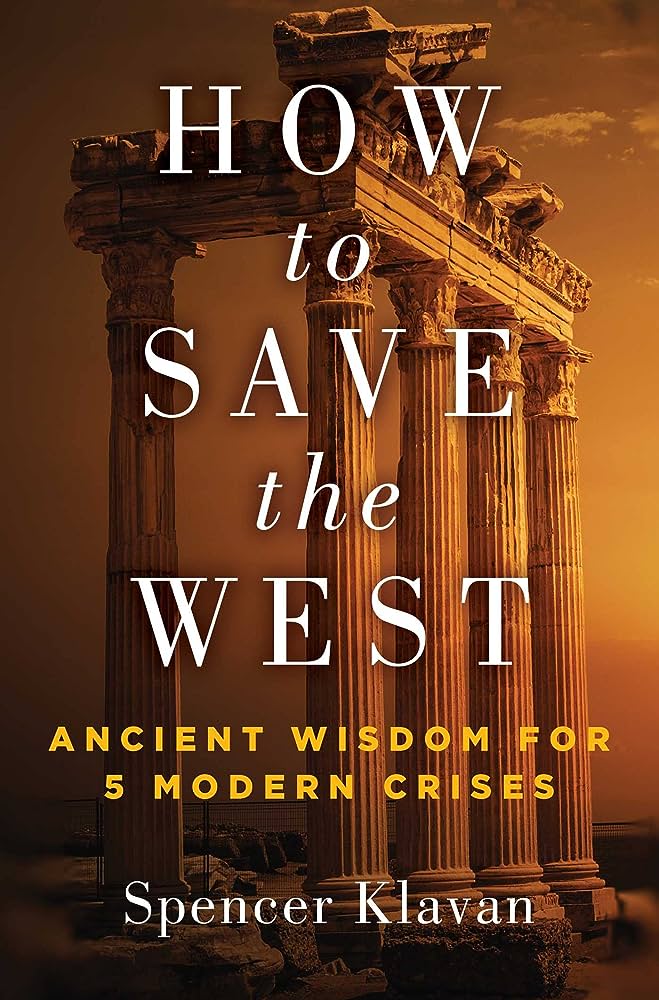“The twenty-first century seems to threaten civilizational collapse at every turn,” writes Spencer Klavan in his new book, How to Save the West. He goes on to say, “the West is always on the verge of collapse.” We intuitively feel that both statements are true; given the fires of new global tensions, still emerging from a global pandemic that upended our lives, and increased political fighting and social decay, it is hard not to feel like the apocalyptic preachers are finally having their moment under the dimming sun. Yet we are still here, thousands of years after the first apocalyptic preachers were telling us the world was coming to a sudden ending.
Why, though, are we experiencing the fear of “civilizational collapse” everywhere we look? Klavan identifies five crises that have brought us to the precipice: “the crisis of reality, the crisis of the body, the crisis of meaning, the crisis of religion, and the crisis of the regime.” All of these crises are interlinked. Moreover, they have also flowed from one another in Klavan’s telling. But these crises are also not particularly new. They are, in fact, old—so old that the pantheon of ancient heroes and wisdom can guide us in our current predicament.
Philosophy’s Birth Out of Crisis
Philosophy, as begun by Plato, was born out of crisis. The golden age of Athens had ended. Defeat in the Peloponnesian War wounded the city’s pride. Socrates was condemned to death for “corrupting the youth of Athens.” Plato took up the pen to excoriate the injustice and tyranny of Athens. We have remembered Socrates and Plato ever since and have forgotten the demagogues who condemned Socrates and exiled Plato.
Part of Plato’s legacy was his philosophy of the Forms, or Ideas. In a world where power politics and relativism were all the rage—hidden by the name of sophistry—Plato articulated the need for eternal truth and reality as a means to assure justice, objectivity, and proper living. The crisis Plato found himself in is the recurring crisis that has repeated itself, in augmented form, throughout recorded history. If we do not escape the cave, as Klavan notes, “The whole world, as I imagine it, becomes a matter of my personal will. There is nothing either good or bad, but thinking makes it so.” The world of relativism is a dog-eat-dog world no matter how genteel and sophisticated relativists think we have become. Just look at the twentieth century for a world gone awry in relativistic tyranny.
The heart of the reality crisis goes back to Plato’s contest with the sophists. Either the world and our lives conform to some transcendental reality of good and bad, truth and error, beauty and ugliness, or there is nothing but pure will. Our human flourishing depends on aligning with the Good, True, and Beautiful, or we are stuck with the combative world of Thrasymachus as revived by Nietzsche and nineteenth century German Nihilism, which asserted the primacy of the will to create a new world of values out of the ashes of the old. It should be apparent that the modern world has chosen the combative will of self-creation which is really self-destruction.
Relativism and the Body Crisis
The triumph of relativism over the last two centuries has led to the “body crisis.” Transgenderism and transhumanism are the two most pristine manifestations of this crisis. Without any objective standard of nature, the only thing that does exist is pure will. The body crisis, Klavan asserts, is derived from a Gnostic hatred of the body (nature) and further expounded in the dualism of early modern philosophers like Descartes; both fight constraints on some inner spirit of freedom (the “true self” of today’s propaganda). The war against the body is a tragedy of truly epic proportions.
Readers will find Klavan sympathetic to the problem of gender dysphoria and the contingent identity crises that so many young people suffer. Klavan implies that what is being sold to the next generation is not self-affirmation but self-mutilation, a continuation of the confusion and hatred of the self that is now veiled as a new dogma of truth and self-affirming love. There must be a higher reality that our natures are tied to, for that is what desire implicitly strives for: the fulfillment of its nature. Ultimately, the war against the body is a denial of this. Klavan calls for people to understand this crisis and respond with compassion, not mockery or ridicule.
While Klavan does an admirable job providing the intellectual context to this crisis in just two short chapters, he misses an opportunity to more forcefully articulate the incarnational humanism that is at the core of Christian anthropology.
Christianity’s ignorant and ungrateful critics often cast Christian views of the body and human nature as crude, backward, and sexist. Anyone with even a basic theological education knows the opposite: God so loved the world that he became human to redeem human nature and to sanctify human flesh because it is that important. Christian attitudes to the body are not premised on restriction but sanctity; our flesh is so important to God that God took on human flesh to redeem and sanctify it. As N.T. Wright has repeatedly proclaimed against Gnostic hatred of the self and body, then and now, Gnosticism is an empty and pale promise compared to the substantial humanism affirmed by Christianity. Klavan acknowledges that we are body and soul, flesh and spirit, “not a toy,” but ultimately stops short of articulating the real message of being made in the image of God. We are made in truth for truth and in love for love. Our world devoid of truth and love has led to the body crisis and our various identity crises which are harming souls.
The Problem of Scientism
Nevertheless, the crisis of reality and the body has exploded into the contemporary crisis of meaning. If there is no objective truth and if my body is a restriction upon my freedom, then what meaningful purpose is there in life beside my own pathological desires? This is the problem that science—post-Darwin—does not want to acknowledge and, frankly, cannot answer.
Science, that now mythical abracadabra word that is meant to awe us in the presence of its magicians (like Neil deGrasse Tyson or Richard Dawkins), proclaims itself the arbiter of objectivity yet also states—in its popular form disseminated across the worldwide web—that all things happened at random: from the Big Bang to human evolution. Science wants to have its cake and eat it too. If everything is desire and random happenchance, what actual meaning does science provide other than telling me that I am a random assortment of atoms and chemicals bouncing off each other? Don’t ask too many questions, otherwise you may fall prey to that ancient superstition known as love.
The loss of love, transcendental love, is where Klavan’s work shines brightest. The loss of love has led to the current crises in religion and politics. For God is love and love is God, as Saint Augustine told his parishioners when preaching on the Epistles of John: dilectio Deus est (“love is God”). Without love, love of God and neighbor, what can bind this multitude of people together in any sort of communion?
Material self-interest, that doctrine of early modernity sometimes called “classical liberalism,” cannot keep a diverse throng of people together. This is the criticism of Patrick Deneen, whom Klavan cites, for if we try to bind a society through mere economics the “seeds of our present spiritual emptiness, isolation, cultural uniformity, and loss of freedom” is sown. The low materialism of common economics creates a cultural wasteland.
Even those whom we mistakenly identify as classical liberals, like John Milton or the Founding Fathers, knew better. “Love virtue, she alone is free,” wrote Milton. “With slight shades of difference, you have the same religion, manners, habits, and political principles,” George Washington wrote in his farewell address. “[O]ur Constitution was made only for a moral and religious People,” said John Adams.
Love, God, and the Future of Civilization
Without this common love to unite a commonwealth of people, the regime crisis dissolves into class and racial conflict, power-struggle, and self-interest (only logical if a political community is premised on self-interest). Republics, most especially, are prone to this problem. The liberty and justice which republics are erected to safeguard requires, as Milton and the Founders knew, a moral, virtuous, and religious citizenry. Without this moral and virtuous spirit, the citizenry is slothful and servile. Despotism takes hold once the bulwark of liberty and justice, moral love, has withered away. Welcome to the twenty-first century.
In the end, Klavan exhorts us to return to our families, our friends, our communities. But this (re)attachment to families, friends, and community requires love. Not just any kind of love. Not the sentimental feeling of erotic high preached to us as the essence of love since the Romantic era. It requires the love which inspires virtue and justice that comes from fidelity to God. “I have stressed throughout this book,” Klavan writes, “that all the good and noble things we want to fight for cannot exist unless God does.” For God is Truth, Wisdom, and Love itself. That is the most ancient wisdom to be found in the pantheon of ruined marble and old books that Klavan guides us to and through in this timely and important book.
Image credit: “The Spa Promenade” by Thomas Jones Barker via Wikimedia Commons













“Just look at the twentieth century for a world gone awry in relativistic tyranny.”
Oh please. Can you at least back up this kind of gratuitous “we all know” (“just look at”) with some examples? Pol Pot, Mao, Stalin, Hitler — none was a relativist.
Good analysis of Plato, though. Thanks for that.
Comments are closed.